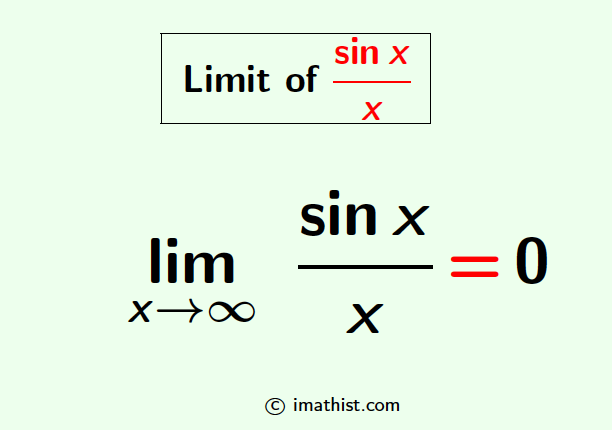The limit of sinx/x as x approaches infinity is equal to zero. That is, limx→∞ sinx/x = 0. This can be proved using the Squeeze Theorem of limits which will be done here.

Limit of sinx/x as x goes to infinity
Question: What is the limit of sinx/x when x→∞.
Answer: The limit of sinx/x when x tends to infinity is equal to 0.
Explanation:
We know that the value of sinx lies between -1 and 1 for any real number x, that is,
-1 ≤ sinx ≤ 1
Dividing by x, we get that
$-\dfrac{1}{x} \leq \dfrac{\sin x}{x} \leq \dfrac{1}{x}$
Taking limit x→∞, we obtain that
$-\lim\limits_{x \to \infty} \dfrac{1}{x} \leq \lim\limits_{x \to \infty} \dfrac{\sin x}{x}$ $\leq \lim\limits_{x \to \infty} \dfrac{1}{x}$
⇒ 0 ≤ $\lim\limits_{x \to \infty} \dfrac{\sin x}{x}$ ≤ 0
As $\lim\limits_{x \to \infty} \dfrac{\sin x}{x}$ lies between 0 and 0, it is actually 0. So we obtain that the limit of sinx/x is equal to zero when x goes to infinity. The method used here is known as the Squeeze Theorem of limits.
Read Also: Limit of sinx/x when x→0
Limit of sin(1/x) as x→0 | Limit of cos(1/x) as x→0
Limit of sinx/x when x→∞ | Limit of x/sinx when x→0
Limit of sin(x2)/x when x→0 | Limit of sin(√x)/x when x→0
Remark:
- Following the same approach as above, we can prove that the limit of sinx/x2 when x→∞ is also equal to 0.
- As -1 ≤ cosx ≤ 1, by the Squeeze Theorem of limits, we get that the limit of cosx/x when x→∞ is equal to 0.
ALSO READ:
Question-Answer
| Question 1: Find the limit limx→∞ sin2x/x |
Answer:
Note that limx→∞ sin2x/x = 2 limx→∞ $\dfrac{\sin 2x}{2x}$
Let t=2x. Then t→∞ when x→∞. So we obtain that
limx→∞ sin2x/x = 2 limt→∞ $\dfrac{\sin t}{t}$ = 2 × 0 (by the above limit)
⇒ limx→∞ sin2x/x = 0.
So the limit of sin2x/x as x approaches infinity is equal to 0.
FAQs
Q1: What is the limit of sinx/x as x goes to infinity?
Answer: By Squeeze Theorem, the limit of sinx/x is equal to 0 as x goes to infinity.